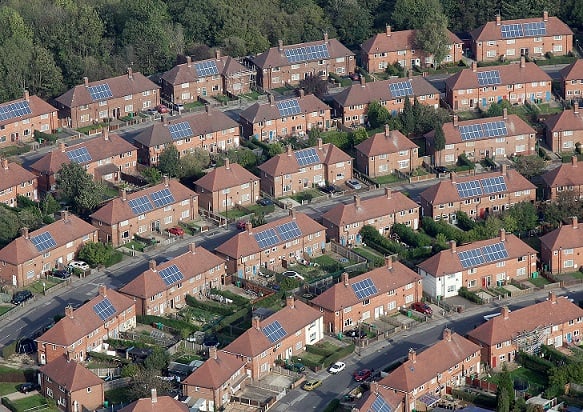
Image: Nottingham City Council
Details of the government’s Smart Export Guarantee (SEG) emerged earlier this week, eliciting responses that range from calling it “better than nothing” to welcoming an end to the “ongoing tragedy” of the policy gap between the feed-in tariff (FiT) and the SEG.
Concerns over the length of the gap have been rife since it was first made clear there would be a policy hiatus.
Frans van den Heuvel, chief executive of Solarcentury, said: “It’s an ongoing tragedy for the solar industry that this wasn’t completed in time for the end of the Feed-in Tariff, as the impact on solar jobs has been severe.
“We have yet to see if this legislation will bring about any kind of renaissance in solar for homeowners, given the threat of increased VAT rates. But still more needs to be done if we, as a country, are going to tackle the current climate emergency with the pace and vigour required.”
Ben Gatley, head of energy trading at Social Energy said that many solar adopters will welcome the SEG but “only because it’s better than nothing”.
Gatley continued to say that those with solar “have been forced to accept an all-time-low IRR of just 0.17% since the end of the FiT.”
“It's nothing to celebrate, especially when some solar adopters will have earned up to 15% IRR during peak times,” he added.
However, Gatley also pointed to the value of storage, which he claims is a “better way” to guarantee a return over selling energy back to the grid.
Léonie Greene, director of advocacy and new markets at the Solar Trade Association, said the STA would be “watching the market like a hawk” to see if offers that properly value the power that solar can contribute to decarbonisation come forward.
“Nevertheless we are hopeful that there are innovative electricity supply companies who understand the importance of incentivising homeowners who want to install solar, battery storage and EV charging as we move towards a smart energy system.
“Barriers still need to be resolved and it is incumbent on government to remove these to encourage as thriving and competitive a market as possible, including for aggregators,” Greene added.
However, many in the industry have welcomed the continued support for small-scale renewables through the SEG.
A spokesperson for Energy UK said: “Small-scale electricity generation has an important role to play in the transition to a low carbon economy, which will be accelerated if the Government adopts the Committee for Climate Change‘s 2050 net-zero target – so we welcome the introduction of the Smart Export Guarantee as a replacement for the Feed In Tariff (FIT) scheme.”
Likewise, Octopus Energy, a supplier already offering two export tariffs, has praised the introduction of the SEG. Greg Jackson, chief executive of Octopus Energy, said that smart export tariffs are “game changing” for harnessing the power of citizens in tackling climate change.
“They mean homes and businesses can be paid for producing clean electricity just like traditional generators, replacing old dirty power stations and pumping more renewable energy into the grid. This will help bring down prices for everyone as we use cheaper power generated locally by our neighbours.”

